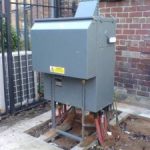Find below a new update from Richard Douglas on the debate between high voltage circuit-breaker or fuse !
Laurent
=========================
 I would like to come back to the debate of last year about MV/LV transformer protection using circuit-breakers or fuses.
I would like to come back to the debate of last year about MV/LV transformer protection using circuit-breakers or fuses.
There were a lot of comments confirming my opinion that circuit-breakers are the best MV/LV transformer protection solution.
However, there were also comments, and that was the debate, that promote fuses as the preferred solution. The main suggested reasons for this are that fuses are: lower in price, have a faster response time for high short-circuit currents, require less maintenance and that it is very simple to understand how they work.
In response to the arguments: faster to respond and simple to understand how they work, you can consult the main points in my article published last year. This article proved that circuit-breakers are a better solution used on real life transformers.
As for the lower price and the less maintenance, I really think that this is an illusion.
Today you can find on the market RMUs equipped with circuit-breakers at a price not very much different from those of fuse solutions. Then considering the total cost during the life time of the equipment, including different criteria such as: initial investment cost, joule losses that are higher for fuses, cost of spare fuses to replace aging fuses or to replace fuses that blow at least once during the lifetime of the switchgear and also think of the labor cost.
As a result, as shown on the graph, it appears that a circuit-breaker solution will always be cheaper than a fuse solution after some years of operation.
Moreover, grids have to be smarter and smarter. Remote control will become common place to facilitate restoration of power in MV networks. Operators are challenged to reduce the number of outages and the duration of these outages. In case of a fault it is necessary to restore power much quicker than before. Just consider the time taken to look for the right fuse and to replace the blown one compared to the time to push a reset button on a circuit-breaker. Also to consider is the corresponding cost of not supplying customers, this cost is not included in the graph above.
So, there are more and more technical and economical reasons to choose circuit-breakers instead of fuse solutions.
Richard Douglas

I do agree with this blog and adding that in some countries are the very electrical companies those who ask for circuit breakers instead of fuse.
..I also agree with that. Fuse I think is more suitable for small residential buildings. The most commonly used is circuit breaker for it is more reliable especially for HV applications.=)
Breaker technology is quite simpler and even it is depend on user load demand so better to use breaker to avoid distortion and failures caused because of fuses
i also think that circuit breaker provide a better protection from a point of view that they are not allowed to respond to sudden short duration transients ,which would else interrupt the supply.
what is the difference between FR and FRLS cables?
generator or engine battery cable is large thick sized cable are using why?
@seshu: Hi it would be really useful if these questions would be asked in a separate post on the forum. Somebody will answer them for sure.
Here is the link. A new thread could be created for these questions.
http://engineering.electrical-equipment.org/forum
Regards,
Moderator
As a long time Electrical and Aeronautical Engineer i recommend the use of circuit breakers since the only depends on the capacity of the load,hence easy to monitor regularly.
I agree with you sir, for me am a substation attendant and every thing is possible with use of circuit breakers, regarding resetting in case of a trip and faults are easy to identify with the use of CBs. Imagine of a fuse blowing and you want to replace it, you will take alot of time de-assembling and assembling the components in order to replace the fuse.